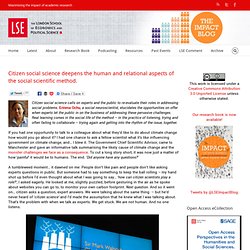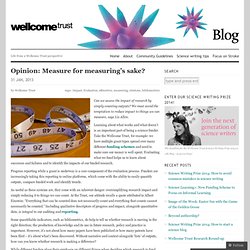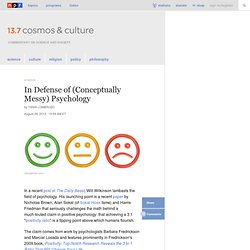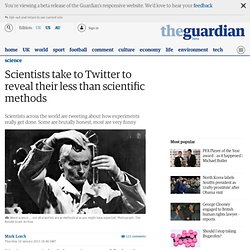

Borges. Citizen social science deepens the human and relational aspects of the social scientific method. Citizen social science calls on experts and the public to re-evaluate their roles in addressing social problems.

Erinma Ochu, a social neuroscientist, elucidates the opportunities on offer when experts let the public in on the business of addressing these pervasive challenges. Real learning comes in the social life of the method – in the practice of listening, trying and often failing to collaborate – trying again and getting into the rhythm of the issue, together. If you had one opportunity to talk to a colleague about what they’d like to do about climate change how would you go about it? I had one chance to ask a fellow scientist what it’s like influencing government on climate change, and… I blew it. The Government Chief Scientific Advisor, came to Manchester and gave an informative talk summarising the likely cause of climate change and the monster challenges we face as a consequence. Image credit: Erinma Ochu A problem shared… Where can we go from here? About the Author Dr. Las concepciones del Estado de Durkheim y Weber ante la teoría política marxista: vínculos, cruces y desacuerdos.
Bruno Latour. Deleuze. Bourdieu. Opinion: Measure for measuring’s sake? Can we assess the impact of research by simply counting outputs?

We must avoid the temptation to reduce impact to things we can measure, says Liz Allen. Learning about what works and what doesn’t is an important part of being a science funder. Take the Wellcome Trust, for example: we have multiple grant types spread over many different funding schemes and need to make sure our money is well spent. Evaluating what we fund helps us to learn about successes and failures and to identify the impacts of our funded research. Progress reporting while a grant is underway is a core component of the evaluation process. As useful as these systems are, they come with an inherent danger: oversimplifying research impact and simply reducing it to things we can count. Some quantifiable indicators, such as bibliometrics, do help to tell us whether research is moving in the right direction; the production of knowledge and its use in future research, policy and practice is important.
Liz Allen 1. Dailymotion. In Defense of Psychology : 13.7: Cosmos And Culture. iStockphoto.com In a recent post at The Daily Beast, Will Wilkinson lambasts the field of psychology.

His launching point is a recent paper by Nicholas Brown, Alan Sokal (of Sokal Hoax fame) and Harris Friedman that seriously challenges the math behind a much-touted claim in positive psychology: that achieving a 3:1 "positivity ratio" is a tipping point above which humans flourish. The claim comes from work by psychologists Barbara Fredrickson and Marcial Losada and features prominently in Fredrickson's 2009 book, Positivity: Top-Notch Research Reveals the 3 to 1 Ratio That Will Change Your Life. But Wilkinson doesn't restrict his critique to Fredrickson and Losada; he sees this latest upset as evidence for deeper and darker problems within the field of psychology as a whole.
If garbage can pass peer review, as long as it is well-written and well-formatted garbage, then the authority conferred by appearing in peer-reviewed publications would seem to be slight.
Judith Butler. Actor-Network Theory. Webdelprofesor.ula.ve/humanidades/anderzon/materias/materiales/Writing_and_Difference__Routledge_Classics_.pdf. Foucault and close. Scientists take to Twitter to reveal their less than scientific methods. Scientists are a precise bunch.

Our experiments are carefully planned down to the last detail, the methods we use are selected with great care and forethought and our sample sizes are perfectly calibrated to ensure statistically valid results. But first our hypotheses are constructed only after carefully reading our peers' work. You can see evidence of this clearly spelled out in any research paper which will invariably present a logical series experiments that lead to a nice clear conclusion all carefully referenced to all the relevant prior-art.
So if a reaction was left for 60 minutes there must be a sound scientific reason for this. And of course the equipment we use is carefully built from only the highest quality parts. Digital Humanities for beginners.
Communication theories. 10 Psychological Experiments That Went Horribly Wrong. Psychology as we know it is a relatively young science, but since its inception it has helped us to gain a greater understanding of ourselves and our interactions with the world.

Many psychological experiments have been valid and ethical, allowing researchers to make new treatments and therapies available, and giving other insights into our motivations and actions. Sadly, others have ended up backfiring horribly — ruining lives and shaming the profession. Here are ten psychological experiments that spiraled out of control. 10. Stanford Prison Experiment Prisoners and guards In 1971, social psychologist Philip Zimbardo set out to interrogate the ways in which people conform to social roles, using a group of male college students to take part in a two-week-long experiment in which they would live as prisoners and guards in a mock prison. 9. Wendell Johnson, of the University of Iowa, who was behind the study Theodore Kaczynski, the Unabomber, also seen top 7. 6. 5.
Occupy Semiotics (Hacia una semiótica del Big Data. Terminaré el 2012 con un post polémico. No tengo intenciones de arruinar las fiestas de fin de año a ningún colega: simplemente me interesa comenzar el 2013 con buenos intercambios y conversaciones… Desde hace años me preocupan las continuidades de la semiótica. O mejor: me intranquiliza la falta de discontinuidades. Dicho en otras palabras: desde hace unas décadas la semiótica de matriz latina prácticamente no ha generado nuevos modelos teóricos.